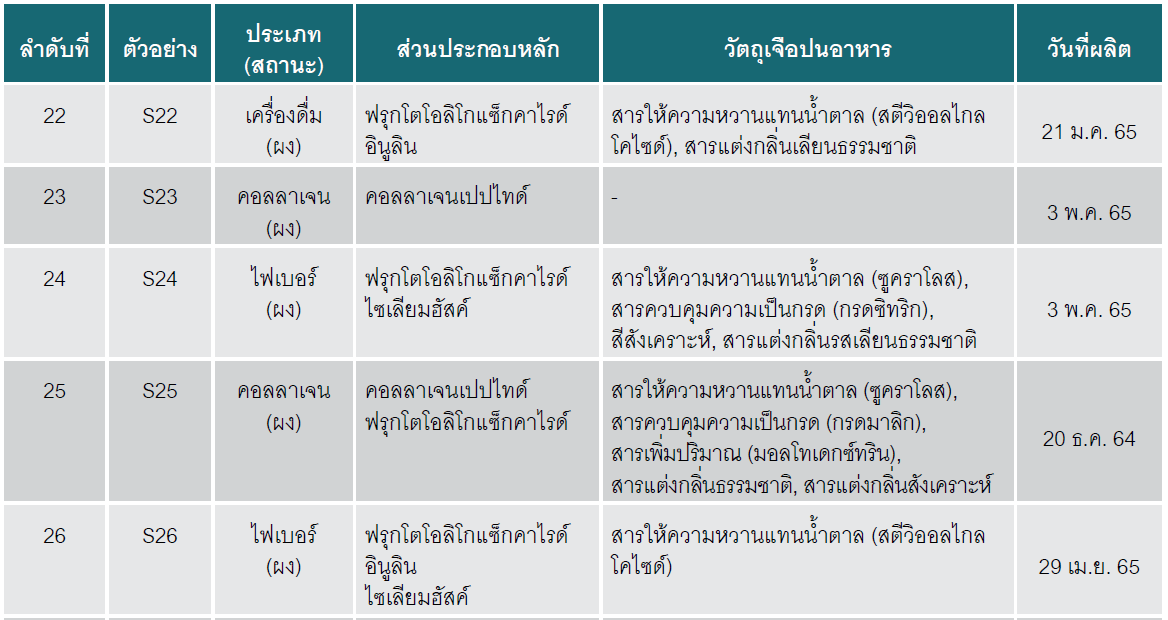Investigation of microbiological quality of dietary supplement products
DOI:
https://doi.org/10.60136/bas.v12.2023.608Keywords:
Microbiological quality, Dietary supplement product, ContaminationAbstract
This research aimed to study the microbiological quality of commercially available dietary supplement products. The contamination of three pathogenic bacteria, Salmonella spp., Staphylococcus aureus and Clostridium spp., as well as an indicator of unhygienic manufacturing process, Escherichia coli, were investigated. The results showed that a total of 33 products did not contain Salmonella spp. S. aureus and E. coli. However, five products contaminated with Clostridium spp. were found. The contamination indicated the distribution of dietary supplement products which do not meet the microbiological standard according to Ministry of Public Health and Food and Drug Administration. These products may be the cause of adverse impacts to customer health.
References
กระทรวงสาธารณสุข. ประกาศกระทรวงสาธารณสุข (ฉบับที่ 293) พ.ศ. 2548 เรื่อง ผลิตภัณฑ์เสริมอาหาร. ราชกิจจานุเบกษา เล่มที่ 122 ตอนพิเศษ 150 ง, 28 ธันวาคม 2548. 2-5.
Dlugaszewska J, Ratajczak M, Kaminska D, Gajecka M. Are dietary supplements containing plant-derived ingredients safe microbiologically?. Saudi Pharm J. 2019;27(2):240-5.
Ratajczak M, Kaminska D, Swiatly-Blaszkiewicz A, Matysiak J. Quality of dietary supplements containing plant-derived ingredients reconsidered by microbiological approach. Int J Environ Res Public Health. 2020;17(18):6837.
สำนักงานคณะกรรมการอาหารและยา. ประกาศสำนักงานคณะกรรมการอาหารและยา เรื่อง หลักฐานและเอกสารประกอบการยื่นขออนุญาตใช้ฉลากของผลิตภัณฑ์เสริมอาหาร และคุณภาพหรือมาตรฐานด้านจุลินทรีย์ที่ทำให้เกิดโรค. ราชกิจจานุเบกษา เล่มที่ 123 ตอนพิเศษ 12 ง, 26 มกราคม 2549. 14-17.
นฤมล ฉ่ำปุ๊ก, ดาริวรรณ เศรษฐีธรรม. การปนเปื้อนจุลินทรีย์และมาตรฐานของผลิตภัณฑ์เสริมอาหารที่บริโภคในครัวเรือน กรณีศึกษาเทศบาลตำบลท่าพระ อำเภอเมือง จังหวัดขอนแก่น. วารสารวิจัย มข. 2557;14:81-91.
International Organization for Standardization (ISO). Microbiology of the food chain – Horizontal method for the detection, enumeration and serotyping of Salmonella – Part 1: Detection of Salmonella spp.. ISO 6579-1:2017(E). Geneva, Switzerland: ISO; 2017.
U.S. Food and Drug Administration (FDA). Bacteriological analytical manual Chapter 12: Staphylococcus aureus [Internet]. 2016 [cited 2022 May 15]. Available from: https://www.fda.gov/food/laboratory-methods-food/bam-chapter-12-staphylococcus-aureus
U.S. Food and Drug Administration (FDA). Bacteriological analytical manual Chapter 4: enumeration of Escherichia coli and the coliform bacteria [Internet]. 2020 [cited 2022 May 15]. Available from: https://www.fda.gov/food/laboratory-methods-food/bam-chapter-4-enumeration-escherichia-coli-and-coliform-bacteria
United States Pharmacopeia (USP). <2022> Microbiological procedures for absence of specified microorganisms-nutritional and dietary supplements. USP 42/NF 37 Vol. 5. Rockville, Maryland: United States Pharmacopeia; 2019. p. 9057-749.
Sabater-Molina M, Larqué E, Torrella F, Zamora S. Dietary fructooligosaccharides and potential benefits on health. J Physiol Biochem. 2009;65(3):315-28.
Franco EAN, Sanches-Silva A, Ribeiro-Santos R, de Melo NR. Psyllium (Plantago ovata Forsk): from evidence of health benefits to its food application. Trends Food Sci Technol. 2020;96(1):166-75.
León-López A, Morales-Peñaloza A, Martínez-Juárez VM, Vargas-Torres A, Zeugolis DI, Aguirre-Álvarez G. Hydrolyzed collagen—Sources and applications. Molecules. 2019;24(22):4031.
Magnuson BA, Roberts A, Nestmann ER. Critical review of the current literature on the safety of sucralose. Food Chem Toxicol. 2017;106(Pt A):324-55.
Dürre P. Physiology and sporulation in Clostridium. Microbiol Spectr. 2014;2(4):1-14.
Shen A, Edwards AN, Sarker MR, Paredes-Sabja D. Sporulation and germination in clostridial pathogens. Microbiol Spectr. 2019;7(6):1-47.
Tapia MS, Alzamora SM, Chirife, J. Effects of water activity (aw) on microbial stability: as a hurdle in food preservation. In: Barbosa-Cánovas GV, Fontana AJ, Schmidt SJ, Labuza TP, editors. Water activity in foods. Iowa: Blackwell Publishing; 2007. p. 323-55.

Downloads
Published
How to Cite
Issue
Section
License
Copyright (c) 2023 Bulletin of Applied Sciences

This work is licensed under a Creative Commons Attribution-NonCommercial-NoDerivatives 4.0 International License.









